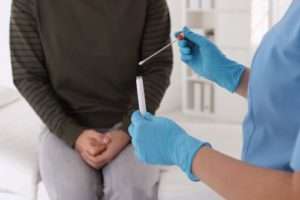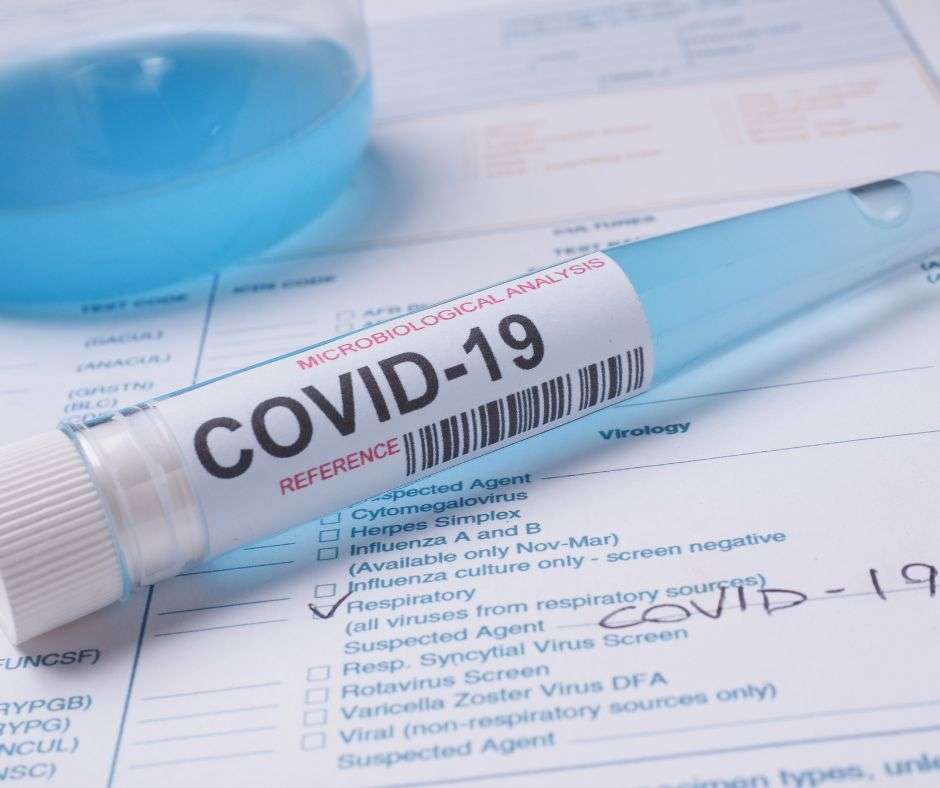COVID-19 Testing Recommendations
 We hope that you, your family and your staff are all well and remain free of the novel coronavirus (COVID-19). Our team of healthcare professionals at Healthline Medical Group are first responders with respect to assisting both patients and employers with crucial information regarding the coronavirus that will impact you, your family and your extended family in the workplace. It is therefore of paramount importance that we explain COVID-19 testing and answer questions that pertain to the safety of the patient who might have been exposed to, or has contracted the COVID-19 Virus. We also need to address what the test results mean, the variety of tests that can be performed and how those test results help make decisions about returning the patient either to their home or to their workplace.
We hope that you, your family and your staff are all well and remain free of the novel coronavirus (COVID-19). Our team of healthcare professionals at Healthline Medical Group are first responders with respect to assisting both patients and employers with crucial information regarding the coronavirus that will impact you, your family and your extended family in the workplace. It is therefore of paramount importance that we explain COVID-19 testing and answer questions that pertain to the safety of the patient who might have been exposed to, or has contracted the COVID-19 Virus. We also need to address what the test results mean, the variety of tests that can be performed and how those test results help make decisions about returning the patient either to their home or to their workplace.
The most frequently asked questions that we receive are the following:
1. Do you perform COVID-19 testing at Healthline Medical Group?
Yes, we do.
2. Can I come into your facility to get tested?
Yes, you may come in to be evaluated for Covid-19. To protect every patient’s safety and appropriately triage our patients, presentation to our office, versus a Hospital Emergency Room setting is determined on a case-by-case basis. We recommend either a phone call or telemedicine visit before you come into our office if you are symptomatic.
3. What is Healthline Medical Group doing to mitigate against an infected patient spreading COVID-19 to other patients?
In addition to proper social distancing and cleansing of our office after each patient leaves an area of the office, we are providing telemedicine visits to help prevent a high-risk patient from coming into our office and infecting other patients. We are also providing Covid-19 testing in the patient’s vehicle to help reduce the spread of this virus to other patients who are in our medical facility. Patients are required to fill out a short questionnaire and have their temperature checked upon arrival at our office.
We have also begun an e-Registration (electronic online registration) process to reduce waiting time in our waiting room, which will promote social distancing.
4. Which tests does Healthline Medical Group currently offer?
- PCR-RNA Nasal Pharyngeal Swab tests and Antibody blood tests
- We also offer the nasopharyngeal Rapid Antigen Tests.
5. How long does it take to get test results?
- 2 to 3 days for the PCR-RNA nasal swab and 48 hours for the IgG blood test
- 15 minute turn – around time for results with the Rapid Antigen Tests.
6. Do you provide the instant IGG/IGM fingerstick rapid tests for Coronavirus?
No
7. What do you recommend to employers who will be starting the process of bringing their employees back into the workplace?
- Temperature screening of all employees with a forehead thermometer that does not touch the skin. Order now as forehead thermometers are in short supply and in high demand.
- Short questionnaire regarding any current illness that the employee may have, or any of the employee’s family members may have that the employee may have been exposed to.
8. Is there currently any inexpensive and accurate home screening test for COVID-19 that we can provide to our employees ?
Yes. All of the major pharmacies are now offering rapid antigen take home tests. Please contact your local pharmacist for recommendations. Quidel and BianaxNow are two of the common take home tests that you can purchase at your local pharmacy.
Take-Home Messages
- At this point in time, do not rely on the Rapid IGG/IGM fingerstick blood tests for the Coronavirus. Too many false negative and false positive tests have been noted to render this a reliable screening test. However we do have several rapid nasopharyngeal swab tests that when used in the proper clinical setting can provide important information. The sensitivity and specificity for these rapid tests falls in the 70-80 % accuracy range for the Delta variant, but only 40 % for the Omicron variant. Therefore the the test results must be carefully evaluated and may not necessarily accurately reflect whether or not the patient has Covid-19. On a case-by-case basis, we can perform rapid tests and if negative follow that with the gold standard PCR-RNA nasal swab test or an IGG blood test for the Coronavirus if indicated.
- Since COVID-19 testing as it currently exists does not guarantee that an individual is free of the Coronavirus, we must maintain social distancing, wear face masks and, for healthcare personnel, use other PPE until more advanced and definitive testing becomes available.
 In summary, we currently do have an inexpensive Rapid test that we can provide for our patients for screening purposes, but if negative we still need the gold standard PCR-RNA test done for patients who are at high risk for having developed COVID-19. We have been providing Telemedicine visits for our patients so that we can take a proper history and screen the patient to make a determination as to what testing, if any, should be performed. It is very difficult as healthcare professionals to advise a patient not to come into our office, but in select cases that is in fact what we have been having to do. Click here for our instructions to our patients as to what testing should be performed. Please do not hesitate to contact us if you have questions regarding this matter.
In summary, we currently do have an inexpensive Rapid test that we can provide for our patients for screening purposes, but if negative we still need the gold standard PCR-RNA test done for patients who are at high risk for having developed COVID-19. We have been providing Telemedicine visits for our patients so that we can take a proper history and screen the patient to make a determination as to what testing, if any, should be performed. It is very difficult as healthcare professionals to advise a patient not to come into our office, but in select cases that is in fact what we have been having to do. Click here for our instructions to our patients as to what testing should be performed. Please do not hesitate to contact us if you have questions regarding this matter.
https://healthlinemedgroup.com/covid-19-more-information/
Who Should Be Tested for COVID-19, When Should They Be Tested & With Which Test?
Recommendations for Healthcare Workers Who Have Been Properly Wearing PPE
- No illness or symptoms – No testing recommended
- No illness or symptoms, but if you came in contact with a patient known to be COVID-19 positive – A rapid nasopharyngeal swab test can be performed. If positive, you have Covid-19. If negative a PCR-RNA nasal swab test should be done. If Positive quarantine for 5-10 days; if no symptoms develop, return to work after 5 days have passed since the date you tested positive. The Flowchart below addresses how the patient’s Exposure Risk Level helps determine the return-to-work plan for the patient. This must be determined on a case-by-case level after appropriate screening is performed either in our office or via a Telemedicine visit.
- Symptomatic with fever, cough, shortness of breath, abdominal pain and/or diarrhea – A PCR-RNA nasal swab test and quarantine for 5-10 days; may need hospitalization for shortness of breath or pulse oximetry on room air under 94%
Who Should Be Tested for COVID-19, When Should They Be Tested & With Which Test?
As of December 23, 2021
Due to concerns about increased transmissibility of the SARS-CoV-2 Omicron variant, this guidance is being updated to enhance protection for healthcare personnel (HCP), patients, and visitors, and to address concerns about potential impacts on the healthcare system given a surge of SARS-CoV-2 infections. These updates will be refined as additional information becomes available to inform recommended actions.
- Ensure that SARS-CoV-2 testing is performed with a test that is capable of detecting external icon SARS-CoV-2, even with currently circulating variants in the United States.
- Updated recommendations regarding when HCP with SARS-CoV-2 infection could return to work
- The definition of higher-risk exposure was updated to include use of a facemask (instead of a respirator) by HCP if the infected patient is not also wearing a facemask or cloth mask.
- Added options that would allow asymptomatic HCP with a higher-risk exposure who have not received all COVID-19 vaccine doses, including booster dose, as recommended by the CDC to return to work prior to the previously recommended 14-day post-exposure period of work restriction, assuming they do not develop symptoms or test positive for SARS-CoV-2.
Key Points
- In general, asymptomatic HCP who have had a higher-risk exposure do not require work restriction if they have received all COVID-19 vaccine doses, including the booster dose, as recommended by the CDC and do not develop symptoms or test positive for SARS-CoV-2. The duration of protection offered by booster doses of vaccine and their effect on emerging variants are not clear; additional updates will be provided as more information becomes available.
Background
This interim guidance is intended to assist with the following:
- Determining the duration of restriction from the workplace for HCP with SARS-CoV-2 infection.
- Assessment of risk and application of workplace restrictions for asymptomatic HCP with exposure to SARS-CoV-2.
Employers should be aware that other local, state, and federal requirements may apply, including those promulgated by the Occupational Safety and Health Administration (OSHA).


